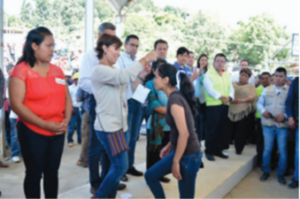Registration systems and processes

ㅤ
Georgia: Exonum Land Title Registry
Partnering with Bitfury (a company that provides blockchain solutions), the National Authority for Property Registration (NAPR) of the Republic of Georgia (with the advisership of renowned economist Hernando de Soto) developed a blockchainbased platform that provides its citizens with a digital certificate of their land title. The land registry uses both permissioned (the Bitcoin platform) and non-permissioned (using the Exonum platform) blockchains. The registration is done in four easy steps;
- a citizen submits a registration request just as in the tradition platform
- the notary registers the land title on the private blockchain, Exonum
- hashes of the Exonum private blockchain are anchored onto the public Bitcoin blockchain ensuring transaction integrity
- the NAPR provides a cryptographically proven digital certificate which is also published on the public Bitcoin blockchain.
In 2018, Georgia registered over 1.5 million land titles on their blockchain-based system. Registration is now done in minutes unlike previously when it took about 3 days. Further, since the technology became operational, land titling costs have been reduced by 90%.
Prevention of the spontaneous process of irregular human settlements: National Institute of Sustainable Land, Mexico

- Figure: Loan securities endowment. Photo: INSUS. Source: https://publications.iadb.org/publications/spanish/document/Vivienda_Qu%C3%A9_viene_de_pensar_la_unidad_a_construir_la_ciudad.pdf
25% of homes in Mexico do not have property titles. The Program to Regularize Irregular Human Settlements (PASPRAH) targets the population that has possession, but does not have legal certainty regarding their lot, that is in a condition of poverty and that is located in localities with 2,500 inhabitants or more. Since its creation, it has managed to streamline the procedures that are carried out in the process of regularizing land tenure under the “ejido”, communal or federal regime through decentralization, deconcentration and administrative simplification. Through the granting of a federal subsidy aimed at the regularization of land tenure in urban locations, it contributes to its improvement and consolidation, since, through regularization, synergies are generated for the provision of infrastructure and social services. The role of the National Institute of Sustainable Land is essential to prevent the spontaneous process of irregular human settlements through agreement and dialogue between civil society and the State.
More information:
- Blockchain for Urban Development: Guidance For Urban Managers, UN-Habitat. Source: https://unhabitat.org/sites/default/files/2022/02/blockchain_for_urban_development_-_guidance_for_urban_managers.pdf
- BID’s Report Vivienda ¿Qué viene?: de pensar la unidad a construir la ciudad. Source: https://publications.iadb.org/publications/spanish/document/Vivienda_Qu%C3%A9_viene_de_pensar_la_unidad_a_construir_la_ciudad.pdf